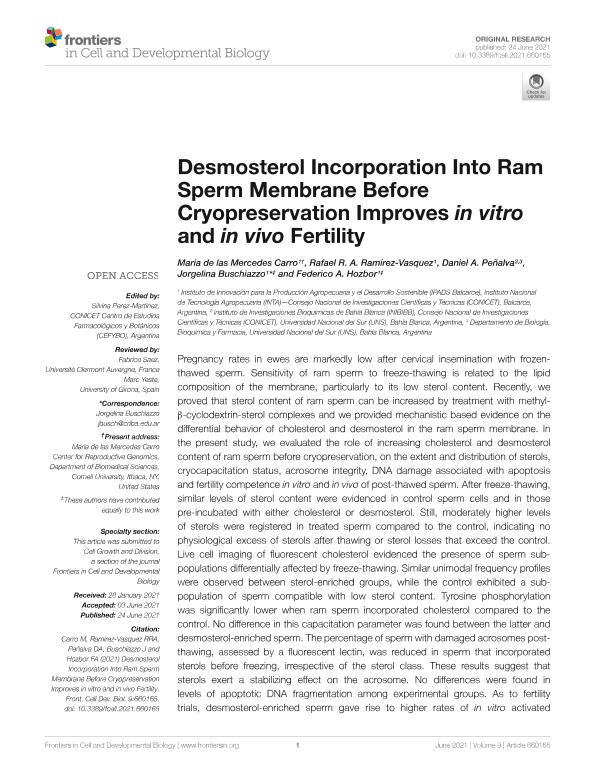Mostrar el registro sencillo del ítem
dc.contributor.author
Carro, Maria de Las Mercedes

dc.contributor.author
Ramírez Vasquez, Rafael Ramón Alejandro

dc.contributor.author
Peñalva, Daniel Alejandro

dc.contributor.author
Buschiazzo, Jorgelina

dc.contributor.author
Hozbor, Federico Andrés

dc.date.available
2022-02-08T15:25:38Z
dc.date.issued
2021-06-24
dc.identifier.citation
Carro, Maria de Las Mercedes; Ramírez Vasquez, Rafael Ramón Alejandro; Peñalva, Daniel Alejandro; Buschiazzo, Jorgelina; Hozbor, Federico Andrés; Desmosterol Incorporation Into Ram Sperm Membrane Before Cryopreservation Improves in vitro and in vivo Fertility; Frontiers Media; Frontiers in Cell and Developmental Biology; 9; 24-6-2021; 660165
dc.identifier.uri
http://hdl.handle.net/11336/151566
dc.description.abstract
Pregnancy rates in ewes are markedly low after cervical insemination with frozen-thawed sperm. Sensitivity of ram sperm to freeze-thawing is related to the lipid composition of the membrane, particularly to its low sterol content. Recently, we proved that sterol content of ram sperm can be increased by treatment with methyl-β-cyclodextrin-sterol complexes and we provided mechanistic based evidence on the differential behavior of cholesterol and desmosterol in the ram sperm membrane. In the present study, we evaluated the role of increasing cholesterol and desmosterol content of ram sperm before cryopreservation, on the extent and distribution of sterols, cryocapacitation status, acrosome integrity, DNA damage associated with apoptosis and fertility competence in vitro and in vivo of post-thawed sperm. After freeze-thawing, similar levels of sterol content were evidenced in control sperm cells and in those pre-incubated with either cholesterol or desmosterol. Still, moderately higher levels of sterols were registered in treated sperm compared to the control, indicating no physiological excess of sterols after thawing or sterol losses that exceed the control. Live cell imaging of fluorescent cholesterol evidenced the presence of sperm sub-populations differentially affected by freeze-thawing. Similar unimodal frequency profiles were observed between sterol-enriched groups, while the control exhibited a sub-population of sperm compatible with low sterol content. Tyrosine phosphorylation was significantly lower when ram sperm incorporated cholesterol compared to the control. No difference in this capacitation parameter was found between the latter and desmosterol-enriched sperm. The percentage of sperm with damaged acrosomes post-thawing, assessed by a fluorescent lectin, was reduced in sperm that incorporated sterols before freezing, irrespective of the sterol class. These results suggest that sterols exert a stabilizing effect on the acrosome. No differences were found in levels of apoptotic DNA fragmentation among experimental groups. As to fertility trials, desmosterol-enriched sperm gave rise to higher rates of in vitro activated oocytes by heterologous fertilization and to significantly lower pregnancy loss in vivo. Our research provides new insights on sterol incorporation into ram sperm prior to cryopreservation, in particular on the additional benefit of incorporating desmosterol as a strategy to improve fertility outcome.
dc.format
application/pdf
dc.language.iso
eng
dc.publisher
Frontiers Media

dc.rights
info:eu-repo/semantics/openAccess
dc.rights.uri
https://creativecommons.org/licenses/by/2.5/ar/
dc.subject
CRYOPRESERVATION
dc.subject
OVINE SPERM
dc.subject
CHOLESTEROL
dc.subject
DESMOSTEROL
dc.subject
ARTIFICIAL INSEMINATION
dc.subject.classification
Bioquímica y Biología Molecular

dc.subject.classification
Ciencias Biológicas

dc.subject.classification
CIENCIAS NATURALES Y EXACTAS

dc.title
Desmosterol Incorporation Into Ram Sperm Membrane Before Cryopreservation Improves in vitro and in vivo Fertility
dc.type
info:eu-repo/semantics/article
dc.type
info:ar-repo/semantics/artículo
dc.type
info:eu-repo/semantics/publishedVersion
dc.date.updated
2021-07-21T16:52:12Z
dc.identifier.eissn
2296-634X
dc.journal.volume
9
dc.journal.pagination
660165
dc.journal.pais
Suiza

dc.journal.ciudad
Lausana
dc.description.fil
Fil: Carro, Maria de Las Mercedes. Consejo Nacional de Investigaciones Científicas y Técnicas. Centro Científico Tecnológico Conicet - Mar del Plata. Instituto de Innovación para la Producción Agropecuaria y el Desarrollo Sostenible - Instituto Nacional de Tecnología Agropecuaria. Centro Regional Buenos Aires Sur. Estación Experimental Agropecuaria Balcarce. Instituto de Innovación para la Producción Agropecuaria y el Desarrollo Sostenible; Argentina. Instituto Nacional de Tecnología Agropecuaria. Centro Regional Buenos Aires Sur. Estación Experimental Agropecuaria Balcarce. Laboratorio de Biotecnología de la Reproduccion; Argentina
dc.description.fil
Fil: Ramírez Vasquez, Rafael Ramón Alejandro. Consejo Nacional de Investigaciones Científicas y Técnicas. Centro Científico Tecnológico Conicet - Mar del Plata. Instituto de Innovación para la Producción Agropecuaria y el Desarrollo Sostenible - Instituto Nacional de Tecnología Agropecuaria. Centro Regional Buenos Aires Sur. Estación Experimental Agropecuaria Balcarce. Instituto de Innovación para la Producción Agropecuaria y el Desarrollo Sostenible; Argentina. Instituto Nacional de Tecnología Agropecuaria. Centro Regional Buenos Aires Sur. Estación Experimental Agropecuaria Balcarce. Laboratorio de Biotecnología de la Reproduccion; Argentina
dc.description.fil
Fil: Peñalva, Daniel Alejandro. Consejo Nacional de Investigaciones Científicas y Técnicas. Centro Científico Tecnológico Conicet - Bahía Blanca. Instituto de Investigaciones Bioquímicas de Bahía Blanca. Universidad Nacional del Sur. Instituto de Investigaciones Bioquímicas de Bahía Blanca; Argentina. Universidad Nacional del Sur. Departamento de Biología, Bioquímica y Farmacia; Argentina
dc.description.fil
Fil: Buschiazzo, Jorgelina. Consejo Nacional de Investigaciones Científicas y Técnicas. Centro Científico Tecnológico Conicet - Mar del Plata. Instituto de Innovación para la Producción Agropecuaria y el Desarrollo Sostenible - Instituto Nacional de Tecnología Agropecuaria. Centro Regional Buenos Aires Sur. Estación Experimental Agropecuaria Balcarce. Instituto de Innovación para la Producción Agropecuaria y el Desarrollo Sostenible; Argentina. Instituto Nacional de Tecnología Agropecuaria. Centro Regional Buenos Aires Sur. Estación Experimental Agropecuaria Balcarce; Argentina
dc.description.fil
Fil: Hozbor, Federico Andrés. Consejo Nacional de Investigaciones Científicas y Técnicas. Centro Científico Tecnológico Conicet - Mar del Plata. Instituto de Innovación para la Producción Agropecuaria y el Desarrollo Sostenible - Instituto Nacional de Tecnología Agropecuaria. Centro Regional Buenos Aires Sur. Estación Experimental Agropecuaria Balcarce. Instituto de Innovación para la Producción Agropecuaria y el Desarrollo Sostenible; Argentina. Instituto Nacional de Tecnología Agropecuaria. Centro Regional Buenos Aires Sur. Estación Experimental Agropecuaria Balcarce. Laboratorio de Biotecnología de la Reproduccion; Argentina
dc.journal.title
Frontiers in Cell and Developmental Biology
dc.relation.alternativeid
info:eu-repo/semantics/altIdentifier/url/https://www.frontiersin.org/articles/10.3389/fcell.2021.660165/full
dc.relation.alternativeid
info:eu-repo/semantics/altIdentifier/doi/http://dx.doi.org/10.3389/fcell.2021.660165
Archivos asociados
